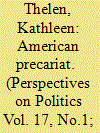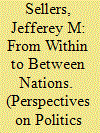|
|
|
Sort Order |
|
|
|
Items / Page
|
|
|
|
|
|
|
| Srl | Item |
| 1 |
ID:
165847


|
|
|
|
|
| Summary/Abstract |
The address situates the rise of “gig” work in the context of a much longer-term trend toward more precarious forms of employment. It explores the forces that are driving these developments and discusses the problems they pose at both the individual level and the national level. By situating the United States in a comparative perspective, it identifies the structural factors that exacerbate the problem of precarity and intensify its effects in the American political economy.
|
|
|
|
|
|
|
|
|
|
|
|
|
|
|
|
| 2 |
ID:
165850


|
|
|
|
|
| Summary/Abstract |
We attempt to integrate the literatures on authoritarian regime types and democratic forms of government. We propose a theoretical framework of five dimensions of executive appointment and dismissal that can be applied in both more democratic and more authoritarian regimes: the hereditary, military, ruling party, direct election, and confidence dimensions, respectively. Relying on the Varieties of Democracy data, we provide measures of these five dimensions for 3,937 individual heads of state and 2,874 heads of government from 192 countries across the globe from 1789 to the present. After presenting descriptive evidence of their prevalence, variation, and relationship to extant regime typologies, a set of exploratory probes gauge the extent to which the five dimensions can predict levels of repression, corruption, and executive survival, controlling for aspects of democracy. This leads to generation of a set of original hypotheses that we hope can serve as building blocks for explanatory theory. We conclude by discussing some limitations of these novel data.
|
|
|
|
|
|
|
|
|
|
|
|
|
|
|
|
| 3 |
ID:
165854


|
|
|
|
|
| Summary/Abstract |
As researchers, when do our ethical obligations end? How should our ethical obligations respond to dynamic and unstable political contexts? Political scientists frequently work in dynamic political situations that can pose new ethical questions beyond those existing at the point of fieldwork. Yet, research ethics are often conceived in terms of a static, if not hermetically sealed, field site that remains frozen in time at the point we conduct fieldwork and collect data. I argue, first, that we need to consider more systematically how a dynamic field intersects with ethical obligations. Second, I argue that new and unexpected ethical questions can emerge after exiting the field, including responsibilities to research participants, dissemination, and publication, and returning to the field, which should be a part of how we conceive of ethical obligations.
|
|
|
|
|
|
|
|
|
|
|
|
|
|
|
|
| 4 |
ID:
165855


|
|
|
|
|
| Summary/Abstract |
We advance efforts to explicate and improve inference in qualitative research that iterates between theory development, data collection, and data analysis, rather than proceeding linearly from hypothesizing to testing. We draw on the school of Bayesian “probability as extended logic,” where probabilities represent rational degrees of belief in propositions given limited information, to provide a solid foundation for iterative research that has been lacking in the qualitative methods literature. We argue that mechanisms for distinguishing exploratory from confirmatory stages of analysis that have been suggested in the context of APSA’s DA-RT transparency initiative are unnecessary for qualitative research that is guided by logical Bayesianism, because new evidence has no special status relative to old evidence for testing hypotheses within this inferential framework. Bayesian probability not only fits naturally with how we intuitively move back and forth between theory and data, but also provides a framework for rational reasoning that mitigates confirmation bias and ad-hoc hypothesizing—two common problems associated with iterative research. Moreover, logical Bayesianism facilitates scrutiny of findings by the academic community for signs of sloppy or motivated reasoning. We illustrate these points with an application to recent research on state building.
|
|
|
|
|
|
|
|
|
|
|
|
|
|
|
|
| 5 |
ID:
165851


|
|
|
|
|
| Summary/Abstract |
Long a staple in the toolkit of American politics, comparison among subnational territorial units has gained increasing currency in comparative politics. A growing portion of subnational research, especially in the monographic literature, employs comparisons of subnational territorial units within different countries. This approach to comparison, which I term transnational comparison, has the potential to build on and extend the advantages of subnational comparison. Despite the numerous added challenges it poses, transnational comparison offers a variety of ways to incorporate and leverage variations between countries as well as within them. Drawing on exemplary studies from the literature on subnational regimes and beyond, I outline a typology of successful transnational comparative strategies. The choice among these strategies depends on their distinctive properties, on the substantive questions asked, and on the stage of a research program. All have contributed to advancing the study of politics beyond nation-centered comparison.
|
|
|
|
|
|
|
|
|
|
|
|
|
|
|
|
| 6 |
ID:
165849


|
|
|
|
|
| Summary/Abstract |
Majority leaders of the contemporary Congress preside over parties that are more cohesive than at any point in the modern era, and power has been centralized in party leadership offices. Do today’s majority parties succeed in enacting their legislative agendas to a greater extent than the less-cohesive parties of earlier eras? To address this question, we examine votes on all laws enacted from 1973–2016, as well as on the subset of landmark laws identified by Mayhew. In addition, we analyze the efforts of congressional majority parties to pass their agendas from 1985 to 2016. We find that enacting coalitions in recent congresses are nearly as bipartisan as they were in the 1970s. Most laws, including landmark enactments, continue to garner substantial bipartisan support. Furthermore, majority parties have not gotten better at passing their legislative programs. Contemporary congressional majorities actually fail on their agenda items at somewhat higher rates than the less-cohesive majority parties of the 1980s and 1990s. When majority parties succeed on their agenda priorities, they usually do so with support from a majority of the minority party in at least one chamber and with the endorsement of one or more of the minority party’s top leaders.
|
|
|
|
|
|
|
|
|
|
|
|
|
|
|
|
| 7 |
ID:
165852


|
|
|
|
|
| Summary/Abstract |
How should we study citizenship in authoritarian regimes? We propose studying how citizenship is performed using the “public transcript”—communication between ordinary citizens and political authorities. The stakes of these strategic communications allow us to observe the roles citizens play to elicit assistance from authoritarian elites. We use this technique to study citizenship in contemporary China, analyzing evidence from an original database of over eight thousand appeals to local officials. These public transcripts reveal three ideal-type scripts of citizenship. First, we observe individuals performing subjecthood, positioning themselves as subalterns before benevolent rulers. We also identify an authoritarian legal citizenship that appeals to the formal legal commitments of the state. Finally, we find evidence for a socialist citizenship which appeals to the moral duties of officials to provide collective welfare. This approach eschews a classification scheme based on regime types, instead acknowledging that diverse performances of citizenship can coexist within a single state.
|
|
|
|
|
|
|
|
|
|
|
|
|
|
|
|
| 8 |
ID:
165853


|
|
|
|
|
| Summary/Abstract |
Explanation presumes description. Description explores the who, when, where, and how, and its answers furnish the raw material for theorizing and explaining. This connection between description and allegedly serendipitous exploration contributed to the notion that description is inherently subjective and thus incapable of being evaluated. I challenge this notion of “mere” description. I show that description has a distinct structure that consists of discreet analytical stages facing distinct inferential challenges. The quality of description thus becomes a function of how well it addresses those challenges. I explicate distinct criteria for evaluating how well a describer handles those challenges. I illustrate their utility by applying them to the controversy in the late 1990s between Daniel Goldhagen and Christopher Browning over what explained the willingness of ordinary Germans to kill Jews.
|
|
|
|
|
|
|
|
|
|
|
|
|
|
|
|
| 9 |
ID:
165848


|
|
|
|
|
| Summary/Abstract |
Scholars and policymakers have highlighted institutions that enable community participation as a potential buffer against existing political inequalities. Yet these venues may bias policy discussions in favor of an unrepresentative group of individuals. To explore who participates, we compile a novel data set by coding thousands of instances of citizens speaking at planning and zoning board meetings concerning housing development. We match individuals to a voter file to investigate local political participation in housing and development policy. We find that individuals who are older, male, longtime residents, voters in local elections, and homeowners are significantly more likely to participate in these meetings. These individuals overwhelmingly (and to a much greater degree than the general public) oppose new housing construction. These participatory inequalities have important policy implications and may be contributing to rising housing costs.
|
|
|
|
|
|
|
|
|
|
|
|
|
|
|
|
|
|
|
|
|